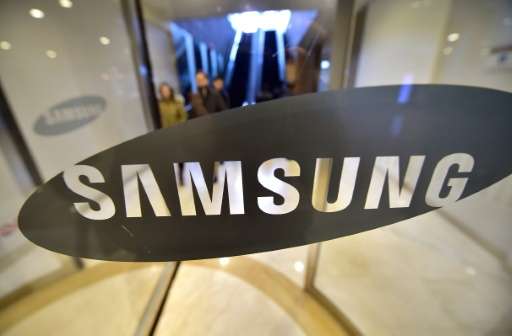Samsung last year agreed to pay Apple some $548 million in the years-long patent battle in federal court in California, pending the outcome of the appeal
The US Supreme Court opened the door to Monday reducing the hundreds of millions of dollars in damages owed by Samsung to Apple in the blockbuster patent case between the world's biggest smartphone makers.
The court agreed to hear one element of the South Korean giant's appeal—it will not reconsider Samsung's guilt, but will look at whether the penalty was excessive for copyright infringement of certain electronic components.
The highest US court posted the appeal on its weekly list of cases it would hear or decline, saying only that it would be "limited to Question 2," or whether patent infringement should result in handing over all profits from a particular component.
Samsung last year agreed to pay Apple some $548 million in the years-long patent battle in federal court in California, pending the outcome of the appeal.
But Samsung argued that $399 million of the penalty was excessive because it was based on the premise that "Apple was 'entitled to' those entire profits no matter how little the patented design features contributed to the value of Samsung's phones," according to the appeal brief.
Attorneys for the South Korean consumer electronics titan argued the massive payout was not warranted because smartphones "contain countless other features that give them remarkable functionality wholly unrelated to their design."
"Even if the patented features contributed one percent of the value of Samsung's phones, Apple gets 100 percent of Samsung's profits," the appeal said.
Aiming at 'patent trolls'
Intellectual property analyst Florian Mueller, who writes a blog on patents, said the ruling is positive for technology companies hurt by frequent lawsuits from holders of patents, sometimes derided as "patent trolls."
"I'm very happy that the Supreme Court will now take a look at an interpretation of the law that would theoretically threaten even a company like Facebook (or little guys—for example, 'indie' app developers) with the prospect of losing their entire profits over a single design patent infringement," Mueller said on his blog.
"I'm hopeful that something good will come out of this. And it wouldn't even be bad for Apple. Once the shoe is on the other foot, Apple, the most profitable company in the history of this industry, will fight the notion of an unapportioned disgorgement as well."
Apple, which has accused its rival of copying numerous features from the iPhone, declined to comment on the latest ruling.
Samsung welcomed the high court action.
"We thank the many large technology companies, 37 intellectual property professors and several groups representing small business which have supported our position," Samsung said in a statement.
"The court's review of this case can lead to a fair interpretation of patent law that will support creativity and reward innovation."
The Computer & Communications Industry Association, which represents a number of tech firms but not Apple, also expressed support for the appeal.
"The technology industry is breathing a sigh of relief that this case will now get the attention it warrants by the nation's highest court," said attorney Matt Levy of CCIA, which filed a brief in support of Samsung.
"The misinterpretation of this law by the Federal Circuit could have disastrous effects on innovation. The lower court could greenlight a new breed of design patent trolls that use design patents to threaten companies' entire profits."
© 2016 AFP






















